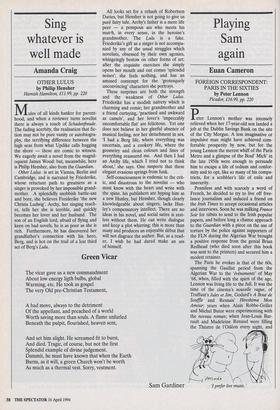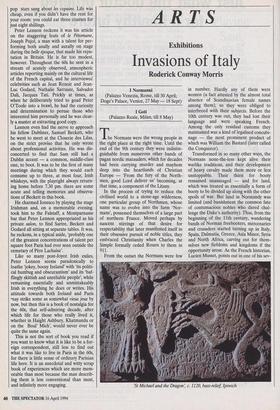Playing Sam again
Euan Cameron
FOREIGN CORRESPONDENT: PARIS IN THE SIXTIES by Peter Lennon Picador, £1 6.99, pp. 220 Peter Lennon's mother was intensely relieved when her 17-year-old son landed a job at the Dublin Savings Bank on the site of the City Morgue. A less imaginative or impulsive man might have achieved com- fortable prosperity by now, but for the young Lennon the merest whiff of the Paris Metro and a glimpse of the Bold' Mich' in the late 1950s were enough to persuade him to escape a life of tedium and confor- mity and to opt, like so many of his compa- triots, for a scribbler's life of exile and insecurity.
Penniless and with scarcely a word of French, he decided to try to live off free- lance journalism and induced a friend on the Irish Times to accept occasional articles and interviews. Soon he was milking France Soir for titbits to send to the Irish popular papers, and before long a chance approach to the Guardian with a piece on the use of torture by the police against supporters of the FLN during the Algerian War brought a positive response from the genial Brian Redhead (who died soon after this book was sent to the printers) and secured him a modest retainer.
The Paris he evokes is that of the 60s, spanning the Gaullist period from the Algerian War to the Yvenements' of May '68, when, filled with the spirit of the age, Lennon was living life to the full. It was the time of the cinema's nouvelle vague, of Truffaut's Jules et Jim, Godard's A Bout de Souffle and Resnais' Hiroshima Mon Amour; years when Alain Robbe-Grillet and Michel Butor were experimenting with the noveau roman; when Jean-Louis Bar- rault and Madeleine Renaud were filling the Theatre de l'Odeon every night, and 'I prefer live music.' pop stars sang about les copains. Life was cheap, even if you didn't have the rent for your room: you could eat three courses for just eight shillings.
Peter Lennon reckons it was his article on the staggering feats of le Petomane, Joseph Pujol, a man with a talent for per- forming both anally and aurally on stage during the belle époque, that made his repu- tation in Britain. He is far too modest, however. Throughout the 60s he sent in a stream of acutely observed, atmospheric articles reporting mainly on the cultural life of the French capital, and he interviewed celebrities such as Jean Renoir and Jean- Luc Godard, Nathalie Sarraute, Salvador Dali, Jacques Tati. Prickly at times, as when he deliberately tried to goad Peter O'Toole into a brawl, he had the curiosity and determination to peruse those who interested him personally and he was clear- ly a master at extracting good copy.
Lennon even had the nerve to approach his fellow Dubliner, Samuel Beckett, who he went to meet at the Closerie des Lilas, on the strict proviso that he only wrote about professional activities. He was dis- concerted to find that Sam still had a Dublin accent — a common, middle-class one, to boot. It was to be the first of many meetings during which they would each consume up to three, at most four, Irish whiskeys, with the playright always return- ing home before 7.30 pm. there are some acute and telling memories and observa- tions of Beckett in this book.
He charmed Ionesco by playing the stage Irishman and, on a memorable evening. took him to the Falstaff, a Montparnasse bar that Peter Lennon appropriated as his private salon, to find Sartre, Beckett and Godard all sitting at separate tables. It was, he reckons, in a typical aside, 'probably one of the greatest concentrations of talent per square foot Paris had ever seen outside the cemetary of Pere Lachaise'.
Like so many post-Joyce Irish exiles, Peter Lennon seems paradoxically to loathe 'jokey, boozy Ireland' with 'its politi- cal humbug and obscurantism' and its 'baf- flingly skittish and unreliable people', while remaining essentially and unmistakeably Irish in everything he does or writes. His attitude towards both Ireland and Paris -nay strike some as somewhat vieux jeux by now, but then this is a book of nostalgia for the 60s, that self-admiring decade, after which life for those who really lived it, whether in Haight Ashbury, Khatmandu or on the Bout' Mich', would never ever be quite the same again.
This is not the sort of book you read if you want to know what it is like to be a for- eign correspondent, still less to find out what it was like to live in Paris in the 60s, for there is little sense of ordinary Parisian life here. It is an anecdotal and witty scrap book of experiences which are more mem- orable than most because the man describ- ing them is less conventional than most, and infinitely more engaging.



























































 Previous page
Previous page